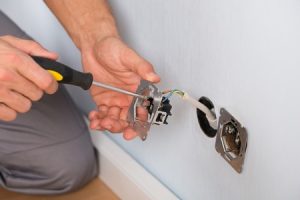
Working with electricity can lead to dangerous situations if the process is not handled with safety-related aspects in mind. However, replacing a light switch or an outlet is not difficult and can be done safely without extensive experience in doing electrical repair work – here are a few DIY electrician tips to remove risks and dangers from the process.
The Risks You Need to Know about Before Doing Any Electrical Work
The hazards of DIY electrical repairs or extensions include electric shock, fires and other kinds of serious injuries. One of the major risks of improperly done electrical repairs is that the fault might not be obvious right after the work is completed – in some cases, improperly installed wires can work for a long time before causing dangerous situations. Another aspect that must be factored in when deciding to handle electrical repairs in a DIY fashion is that the repairs that do not comply with electrical regulations can invalidate the home insurance – obviously, insurers cannot take responsibility for the potential risks caused by amateur repairmen.
Get the Right Tools
To make sure that the electrical repair or upgrade can be done safely, you need to know exactly whether there is any current or cables present in the work area and you will also need the right tools to do the repairs – here are some of the most important tools:
- A cable detector – these little, handheld devices are used to detect cables, circuits, ground wires and short-circuited cables in the wall. You just need to run the instrument along the wall in the area you want to work in and it will make a sign where there is a cable in the wall;
- A phase indicator to determine whether a wire is live or not;
- VDE insulated screwdrivers – very important tools for avoiding accidents,
- VDE cable strippers and cutters – you need insulated tools to be able to cut or strip cables safely as well;
- Protective equipment – insulated gloves and shoes are also important for doing the job safely.
Projects that Can Be Safely Handled and Work that Should Be Avoided by DIY Electricians
If you are not a qualified Denver electrician, you should handle only minor electrical repairs, such as replacing light bulbs, replacing the covers on light switches, adding new lighting points, the replacement of light fittings and sockets and extending circuits in areas other than the bathroom. Any projects that are more complex than simple replacement, such as the complete rewiring of the home or work done in the bathroom should be handled only by professional electricians.
Projects that DIY electricians should never undertake is complex projects that involve rewiring and projects done in bathrooms, around pools or in other areas where high humidity of water is present.
To make sure that your DIY electrical repair or installation is safe, it is a good idea to get it checked by an expert. Most professional electricians do these verifications for a small fee, so they are definitely worth it.
Follow the above DIY electrician tips to make sure your home is safe and functional from an electrical point of view and you will be able to enjoy the fruits of your effort.
